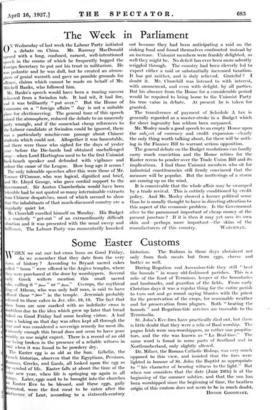The Week in Parliament O S Wednesday of last week the
Labour Party initiated a debate on China. Mr. Ramsay MacDonald opened with a long, confused, earnest, well-intentioned speech in the course of which he frequently begged the Foreign Secretary to put not his trust in militarism. He was pedantic and he was dull, but he created an atmos- phere of genial warmth and gave no possible grounds for offence, claims which cannot be made on behalf of Mr. Mitchell Banks, who followed hiin.
Mr. Banks's speech would have' been a roaring success delivered from a Swindon tub. - It had wit, it had fire, and it was brilliantly " put over." But the House of Commons on a " foreign affairs " day is not a suitable place for electioneering. The general tone of this speech ruined the atmosphere, reduced the debate to an unseemly party wrangle, and if the somewhat cheap references to the Labour candidate at Swindon could be ignored, there was a particularly mischievous passage about Chinese students which could not. Altogether it was lamentable, and there were those who sighed for the days of yester war—before the Die-hards had obtained unchallenged sway—when Lord Hartington used to be the first Unionist back-bench speaker and defended with vigilance and ardour the cause of the League. How long ago it seems !
The only tolerable speeches after this were those of Mr.
erence O'Connor, who was logical, dignified and brief, nd Mr. Lloyd George, who gave cordial support to the Government. Sir Austen Chamberlain would have been tolerable had he not quoted so many interminable extracts from Chinese despatches, most of which seemed to show that the inhabitants of that much-discussed country arc a singularly quiet lot.
Mr. Churchill excelled himself on Monday. His Budget a masterly " get-out " of an extraordinarily difficult ituation and it was presented with the usual sweep and rillianee. The Labour Party was momentarily knocked out because they had been anticipating a raid on the sinking fund and found themselves confronted instead by an increase. Unionist members were frankly delighted, as well they might be. No deficit has ever been more adroitly wriggled through. The country had been cleverly led to expect either a raid or substantially increased taxation. It has got neither, and is duly relieved. Grateful ? I doubt it. Mr. Churchill was listened to with interest, with amusement, and even with delight, by all parties. But his absence from the House for a considerable period would be required to bring home to the Unionist Party his true value in debate. At present he is taken for granted.
The transference of payment of Schedule A tax is generally regarded as a master-stroke in a Budget which for sheer ingenuity has seldom been surpassed.
Mr. Mosley made a good speech to an empty House upon the sub;ect of currency and credit expansion—clearly the only thing worth talking about, for there will be noth- ing in the Finance Bill to warrant serious opposition.
The general debate on the Budget resolutions can hardly carry much conviction and the House retires for the Easter recess to ponder over the Trade Union Bill and its implications. I find those Unionist members who sit for industrial constituencies still firmly convinced that the measure will be popular. But the mutterings of a storm are coming up on the wind.
It is conceivable that the whole affair may be swamped by a trade revival. This is entirely conditioned by credit policy. And Mr. Mosley showed a keener political sense than he is usually thought to have in directing attention to this aspect of the economic problem. Is the Government alive to the paramount important of cheap money at the present juncture ? If it is then it may yet save its own skin and--perhaps more important—the skins of the manufacturers of this country. WATCHMAN.


































 Previous page
Previous page